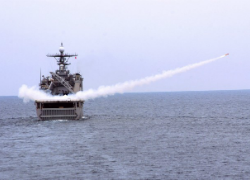China is embroiled in maritime territorial disputes, not only with Japan over control of a group of tiny islands in the East China Sea, but also with The Philippines, Vietnam, Malaysia, and Brunei over the island chains of the Spratleys and Paracels in the South China Sea. The dispute with Japan over the Senkaku (in Japanese) or Diaoyu (in Chinese) Islands has led to angry and violent anti-Japanese protests and demonstrations in over 80 Chinese cities.

The dispute between China and Japan over these islands dates back to 1895, when Japan took control of them during the first Sino-Japanese War. The crisis was a reminder of Chinese humiliation, coinciding with the anniversary of the September 18, 1931, Japanese invasion of Manchuria, followed by 14 years of occupation. The Japanese government’s purchase of three of those islands from their private Japanese owners acted as the trigger for the demonstrations. China considered the purchase a gross violation of its sovereignty, although it has never physically occupied the islands.
The islands, which are rich with fish, oil, and natural gas, are physically controlled by Japan, and are also claimed by Taiwan, which is geographically closer to the islands than China. China asserts a historical claim but Japan says that China’s interest in the territory followed only after studies showed that the waters were rich in natural resources.
In the South China Sea, the US is involved because Beijing has claimed much of the South China Sea as its territorial waters since the early 1990s, which means that foreign ships need to obtain China’s permission before entering those waters. The South China Sea is a strategic international waterway, through which more than one-third of the world’s commercial trade passes, and hence the seafaring nations of India and Australia are also concerned.
While Beijing claims that these islands are an integral part of its territory for the last 2,000 years, Vietnam disputes it, claiming both island chains to have been under its rule since the 17th Century. The Philippines claims are based on geographical proximity to the Spratley Islands and Malaysia’s and Brunei’s arise under the United Nations Law of the Sea Convention as the territory falls within their exclusive economic zones.
China has been flexing its muscles regarding its maritime claims, as it needs energy and both the South China Sea and the East China Sea are energy rich. Also, the area is seen as immensely useful to China’s nuclear strategy, as well, as it seeks to possess a credible sea-based nuclear deterrent.

(World Crunch)
The Association of South East Asian Nations, to which all these countries but China belong, has been seeking to resolve the territorial disputes by peaceful means. However, at a recent meeting of ASEAN in Cambodia, the countries could not even agree on a communique because China did not want any regional negotiations to resolve these competing territorial claims, instead preferring bilateral agreement. US Secretary of State Hillary Clinton supported regional negotiations and a binding code of conduct in that region, which China dismissed as meddling in its internal affairs.
The US has often signaled China that its interest lies in upholding the principle of the freedom of navigation but China remains suspicious, contending that the US has been reassuring the other countries that it supports their claims against China and is intent on containing China.
The US has repeatedly assured China that it is neutral in territorial disputes across the region, and both Secretaries Clinton and Panetta have called for peaceful resolution of territorial disputes among these states in accordance with international law and the Law of the Sea Treaty. However, the US is under a treaty obligation to come to Japan’s aid if it is attacked.
On his recent visit to China, Defense Secretary Leon Panetta spoke with Vice President Xi Jinping, the presumptive next President, who condemned Japan’s purchase of the islands as “a farce.” Other Chinese officials have threatened Japan with unspecified “further actions.”
The stakes are indeed high, as these disputes can lead to dangerous missteps and perhaps even the use of force. Thus, the US efforts to find a peaceful resolution are critical.
Ved P. Nanda is a distinguished Professor of International Law at the University of Denver Sturm College of Law.


